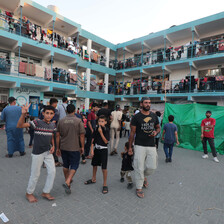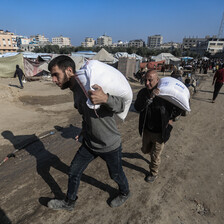The Electronic Intifada Gaza Strip 8 May 2012

Eman, Huda (the author’s mother), Ruqia and Arwa with Omar. (Photo courtesy of the author)
Two Sundays ago, my mother moved from one home in Jericho, in the occupied West Bank, to another in Gaza. She said she felt sad and happy at the same time.
After describing how she was treated roughly by a female Israeli soldier at Erez, the checkpoint on the Gaza-Israel boundary (the soldier had mastered the Arabic word for “not allowed” — mamnoua), my mother spoke of her relief. She left “the many checkpoints” and started looking for a driver to bring her and my youngest brother Omar to the West Bank, where she was born and spent her early years before marrying my dad in 1978.
“When I left the last checkpoint, I didn’t know what to do. I was in a state of disbelief. We first headed to al-Maqased hospital [in Jerusalem], for one of the passengers was supposed to get medical attention there. I always feel dizzy when I get into cars for long hours, but I never felt dizzy that day for I was incredibly happy,” she recalled.
“We crossed the road I used to cross each time I traveled to the West Bank,” she added. “Many things changed. We made it through Deir Yassin village [where Zionist forces committed a massacre in April 1948]. It was as if we Palestinians have to be reminded of massacres when we feel happy.”
“After finally reaching al-Azariya checkpoint [in East Jerusalem], I waited for some time before Ibrahim came and picked me up,” she said, referring to my cousin. “After all these years, I recognized him. We hugged each other so tight. The drivers, who happened to be there, started staring at us.”
The journey from Jerusalem to Jericho must have been filled with anticipation. She must have thought of all the people and things she was eager to see.
“He has white hair now”
“I went to visit my eldest brother, Mohammed, who waited for me next to the gate of his house,” my mother recounted. “I started crying when I saw him. He has white hair now. He was not the man I used to know. We both cried a lot before he invited me into his house, where I met his family.
“The bell rang. It was my sister Arwa and her husband Salah. She rushed to me and held me so tight then burst into tears. I started crying again. I almost lost my voice that day because of crying and laughing
“We chatted then moved to my sister Ruqaia’s house. Arwa asked her: ‘Have not you left to pick Huda up yet?’ Ruqaia replied, ‘I am waiting for my daughter to get home. She has not come from school yet.’
“I suddenly intervened and told her, ‘keep waiting for your daughter.’ She looked at me motionlessly and then ran towards me, hugging me passionately. Though she rarely cries, she burst into tears. She started calling me ‘my beloved, my eyes, my soul, my life’ and she never stopped hugging me.
“We all started crying. Too many tears dropped that day. She went out of the kitchen many times to hug me. We cried and laughed. We laughed enough to heal the wound of the 12 years of being forced apart.
“It was such a lovely gathering. People never stopped arriving. We got back to my eldest brother’s house. We talked about how my parents passed away. I told him how Omar was martyred. How Zeinab passed away,” she said, referring to my eldest brother, who my youngest brother is named after, and my eldest sister, who died due to the siege of Gaza. “I cried as much as I laughed that night.”
“The next day, I went to my youngest brother’s house. There, I saw my parents’ belongings put on the wall. I burst into tears again. Relatives tried to console me. All the old, nice memories came back to me. I started crying again when I saw my youngest brother, Yasser. Time has changed him too much.
“Three days later, my sister Eman got back from Jordan. We started crying again once we met as my brother in-law Nasser’s voice appeared in the background uttering ‘Allah ykazezkin’” — May God disgust you! — a colloquial phrase used in Bethlehem to sarcastically criticize something they don’t like.
“I went to Bethlehem to visit my sister Eman and take Omar to hospital for medical treatment. We spent the most beautiful days there.”
My mother spent 32 days in the West Bank. A day for every year she has lived in Gaza.
She cried as much as she laughed. Palestinians have cried too much. It’s about time we were allowed to laugh more. Every tear we shed should be accompanied by a smile.
Yousef M. Aljamal is a Gaza-based translator and blogger. His website is www.yeljamal.wordpress.com. He can be followed on Twitter: @YousefAljamal.





